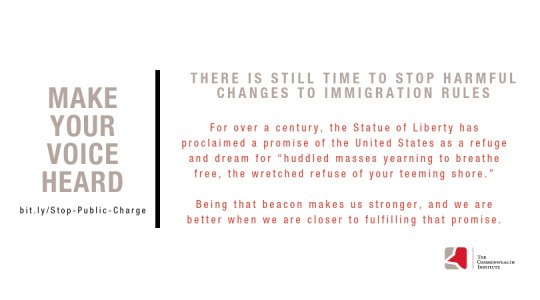October 23, 2018
Proposed Public Charge Changes Would Be Harmful, But There’s Still Time To Stop Them
For over a century, the Statue of Liberty has proclaimed a promise of the United States as a refuge and dream for “huddled masses yearning to breathe free, the wretched refuse of your teeming shore.” Being that beacon makes us stronger, and we are better when we are closer to fulfilling that promise. Yet, that promise has always been unequally applied, from the Chinese Exclusion Act to the turning away of Jewish children fleeing Nazi Germany. Now, the Trump Administration is once again proposing to turn further from that promise, using a proposed radical redefinition of the previous public charge rule to restrict access to green cards and various types of visas for immigrants who are not already fairly well off.
The good news, though, is that these rules are not yet in place and there’s still time to make your voice heard against them. You can submit a public comment against the new rules here: bit.ly/Stop-Public-Charge

The proposed public charge changes would have real consequences right here by making it harder for some Virginians who are already lawfully present in the United States to receive “green cards” and by blocking access for many immigrants seeking to enter the country to reunify with their families.
The direct effect would fall on people applying for a green card or certain visas, as well as U.S. residents hoping to sponsor family members to join them in the United States. For example, lawfully present immigrant women who access prenatal care through Medicaid could have this held against them if they subsequently seek lawful permanent residency (a “green card”).
And the chilling effect would be vastly greater. In a national report on the issue, the Fiscal Policy Institute (FPI) estimates that the chilling effect would extend to 24 million people in the United States, including 9 million children under 18 years old. In Virginia, the chilling effect would include 355,000 people and 151,000 children. These are people in families with at least one non-citizen, and receiving one of the named benefits in order to put food on the table or otherwise meet basic needs. In both cases, the large majority of the impacted kids are U.S. citizens. Estimates looking at income levels, rather than whether someone is receiving a named benefit, are similar: 430,000 Virginians could be discouraged from accessing services to meet basic needs, and 150,000 of these potentially impacted Virginians are children, according to data from Manatt. Latinx and Asian American communities would be most harmed, with one in three Latinx Virginians and one in eight Asian American Virginians likely experiencing this chilling effect.
That matters because many families occasionally need a hand up, and helping parents and children maintain stability through tough times helps children succeed in the long run. Building communities and an economy that works for everyone includes protecting access to critical basic needs programs so that immigrant families, like their U.S.-born neighbors, can take their sick child to the doctor without worrying that it will impact their immigration status.
Community leaders are already reporting that the proposed rule redefinition is causing families to drop services such as health care out of fear. Losing health coverage can have long-term negative consequences for children’s health, educational attainment, and financial success as adults. And assistance with purchasing healthy food through SNAP improves birth outcomes and long-term health for young children. One in four Virginia children has at least one foreign-born parent, and the long-term success of Virginia’s economy and communities requires that Virginia children of immigrants are able to build successful lives.
The economic effects are also significant. Looking at just food and health supports, FPI modeled three scenarios: if 15, 25, and 35 percent of those experiencing the chilling effect disenroll. Using the middle scenario, we could expect a $12 billion reduction in supports to families around the country, and up to a $24 billion hit to the national economy as hospitals and doctors’ offices see reduced revenues and people buy less in supermarkets and other stores. That translates to as many as 164,000 jobs lost. The economic effects of these benefit programs also serve as an automatic stabilizer, with the biggest positive impact during a recession, when it is most needed, and smaller impacts during an expansion.
In Virginia, the 25 percent disenrollment scenario means $96 million less in federal funds coming into Virginia, a ripple effect of $183 million felt through the health care and food industries, as well as elsewhere, and up to 1,240 jobs lost.
As with prior generations of immigrants, when today’s newcomers arrive in the United States, most have little money and may need time to find their footing to succeed in their new country. This was true for my own family–when my great-grandfather arrived in the United States in 1905, he had few skills, spoke no English, and had only an 8th grade education. But over time, like most immigrants, he and his children were able to put down roots and do better financially, helped along by public services such as free public education and family ties as other relatives were also able to escape religious and political violence and reunite in the United States. They brought with them new ideas, started new businesses, and eventually sent their own children to college. For many around the world, that’s the American Dream.
New rules that target immigrant families for seeking assistance for their children during tough times – just as U.S.-families do – and imposing new income, wealth, and English-language tests would have made that reunification and economic progress impossible for my family if they had been in place 100 years ago, and today they threaten the American Dream for a new generation of immigrants. That’s bad for the economy, and it’s also plain wrong.
The proposed rules are not retroactive–no use of much-needed basic assistance before the proposed regulatory changes go into effect would be considered as families seek to adjust their status or reunite with relatives. More information for immigrant families seeking to understand the impact of these rules for themselves is available in English and Spanish here: https://www.clasp.org/publications/fact-sheet/public-charge-new-threat-immigrant-families
Category:
Immigration
